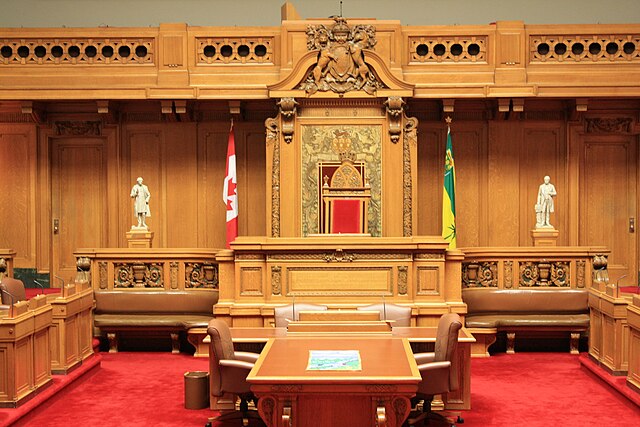Professor Marcia McKenzie, Professor Emily Eaton, & Dr. Kristen Hargis
Saskatchewan Premier Scott Moe recently announced new oil and gas courses that will be offered to grade 11 and 12 students in the province to prepare students to work in those industries.
The Saskatchewan Distance Learning Centre, which provides Kindergarten to Grade 12 online education to Saskatchewan students, partnered with Teine Energy, an Alberta-based company to develop the courses. They will include 50 hours of online theory and 50 hours of work placement.
This training will directly benefit oil and gas companies and prepare students for careers in industries that other jurisdictions — like Québec — are phasing out.
As global leaders and agencies call for a wind-down of the use of fossil fuels, Saskatchewan is winding up its partnership with oil and gas in education by joining hands with an industry referred to by the UN Secretary General as “godfathers of climate chaos.”
As researchers who have examined sustainability and education, we are concerned that Saskatchewan’s focus on preparing students for careers in oil and gas is not just detrimental for the planet, it’s bad news for students’ future employment prospects.
Instead of training high school students for an industry that the world is transitioning away from, we need education on energy alternatives and ways of addressing climate change impacts.
Phasing out Fossil Fuels Essential
The United Nations Intergovernmental Panel on Climate Change, which gathers climate scientists to synthesize research from around the world, has made it clear that “immediate and rapid action to phase out fossil fuels is essential for curbing climate change.”
This is called for, given that fossil fuels account for over 75 per cent of greenhouse gas emissions globally.
In order to limit global warming to 1.5 C, as agreed upon in the Paris Agreement, countries must reduce overall greenhouse gas emissions 45 per cent by 2030 and reach net zero by 2050.
Most Canadian provinces and 46.5 per cent of Canadian municipalities have legislated or adopted policies to reduce greenhouse gas emissions significantly by 2030 and achieve net zero by 2050.
In stark contrast, Saskatchewan has set no quantifiable economy-wide targets at all; the province has only committed to a few sector-specific goals, such as reducing emissions from electricity production 50 per cent below 2005 levels by 2030. The province’s 2017 climate change strategy vaguely commits to “reduce greenhouse gas emissions, enhance biodiversity and educate the public about the effects of climate change” (italics added).

The Chamber of the Legislative Assembly of Saskatchewan, Canada
Photo Credit: Makaristos


UNESCO-comissioned report on climate change and sustainability content in secondary school curricula
Relevant Climate Education Needed
Education is indeed key to addressing the climate crisis, but how this is done matters immensely.
A new report from the United Nations Educational, Scientific and Cultural Organization (UNESCO), Education and climate change: learning to act for people and planet, highlights how climate change and education are interlinked. Marcia McKenzie, one of the authors of this story, co-authored this report.
Climate change is already disrupting educational systems and student outcomes. At the same time, education is also crucial for advancing climate mitigation and adaptation.
Internationally, nations are committing to increasing climate change education, including at the recent UN Transforming Education Summit where it was “confirmed that education must be transformed to respond to the global climate and environmental crisis.”
The summit saw the formation of a new Greening Education Partnership, which set a goal to double the number of countries with climate education in their curricula.
To take the pulse on countries’ current inclusion of climate change in curricula, a new UNESCO-commissioned report, examined the curricula of over 80 countries to assess inclusion of climate change content in their Grade 9 science and social science curricula. McKenzie also co-authored this report, and Kristen Hargis, another author of this story, contributed with research analysis. The study found Canada’s inclusion of climate change content to be lacking in comparison to over 80 countries, particularly within Saskatchewan.

Youth Engaged in Learning Outdoors
Photo Credit: Bruce McAllister, EPA
Saskatchewan Climate Education Lacking
While Saskatchewan has comprehensive science climate change curricula, this content isn’t designed to foster critical thinking or climate action.
Furthermore, researchers have found that the majority of students and schools are opting out of courses that have an explicit climate science focus and there is constant pressure on teachers to “balance” out climate science with industry perspectives.
The government’s oil and gas course initiative means allowing oil and gas industries to partner on curriculum and teaching resources, and bring fossil fuel-oriented perspectives into the classroom. Oil and gas-sponsored curricula have been shown to promote a perspective on climate change that individuals are both the source of the problem and the most effective locus for action.
This emphasis on individual responsibility shifts accountability away from fossil fuel corporations that are the more significant source of emissions.
Questionable Job Planning
Research from Clean Energy Canada has indicated that by 2050, Canadian jobs in the oil industry will decline by 98 per cent.
Meanwhile EcoCanada predicts a shortage of over 480,000 jobs in the environmental sector over the next decade.
Preparing students to work in an industry causing the climate crisis also seems to go against what most students want. A recent study of 1,000 youth (aged 16-25) in Canada found that 56 per cent felt “afraid, sad, anxious and powerless” about climate change. The survey asked participants about their perspectives on climate change, how hopeful they feel about the future in the face of climate change, and whether they think the government is taking enough action, including in education.
To address identified gaps in these areas, many youth around the world are calling for increased action on climate change, as well as increased quality climate change education in schools.
School Systems Need to do More
Here in Canada, 64 per cent of Canadians believe school systems should be doing a lot more to educate students on climate change and a renewable future.
This includes furthering the socio-emotional and action-oriented capacities of youth as they will face the climate crisis through their careers and lives. It also means addressing climate justice issues, and recognizing the leadership of Indigenous communities in responding to climate change.
This article is republished from The Conversation under a Creative Commons license. Read the original article.
About the AuthorS

Marcia McKenzie Professor and Associate Dean Sustainability in the Faculty of Education, University of Melbourne. She is Director of the Monitoring and Evaluating Climate Communication and Education (MECCE) Project (www.mecce.ca), University of Saskatchewan. Her research areas include global education policy research, geographies of education, and climate and sustainability education, including in relation to place, mobilities, and affect theory. She is co-author/editor of six books, including Researching Global Education Policy: Diverse Approaches to Policy Movement (Policy Press, 2024) and Navigating the Research-Policy Relationship: Studies in Environmental and Sustainability Education (2024, Routledge); and co-edits the book series Lobal Global Issues in Education (Routledge) and Studies in Education and the Environment (Palgrave).

Emily Eaton is a white settler doing community-based research, teaching and service devoted to addressing the climate and inequality crises at local and national scales. Central to this work is understanding the power and influence of the fossil fuel industries and mapping pathways to climate action that prioritize the needs of marginalized communities and that rectify the unjust colonial relationship that Canada has with Indigenous Peoples. She is a co-investigator on a SSHRC Insight grant titled: Décarbonisation, transition écologique et verrou carbone: discours et organisation sociale des mouvements pour la transition et de l’élite anti-transition dans l’est Canadian. This grant examines movements for energy transition and movements opposing energy transition in Québec and Atlantic Canada. Her previous work has included studies of the oil industry’s influence on rural instiutions and culture in oil-producing communities and in public education.

Kristen Hargis is a MECCE Project Postdoctoral Scholar who specializes in quality climate change education policy and practice. She is currently coordinating a UNESCO commissioned project analyzing curricula from at least 75 countries for the inclusion of climate change education. She also coordinates the Project’s US Landscape Analysis, which explores state-level uptake of climate change education in policy across primary, secondary, and higher education in partnership with the North American Association for Environmental Education. Since 2013, she has worked with the MECCE Project and its host, the Sustainability and Education Policy Network (SEPN), on a range of projects including several UNESCO consultancies and SEPN’s Canadian Landscape Analysis. She holds a Ph.D. in Environment and Sustainability from the University of Saskatchewan and received her M.Ed. in Educational Foundations from the University of Saskatchewan.